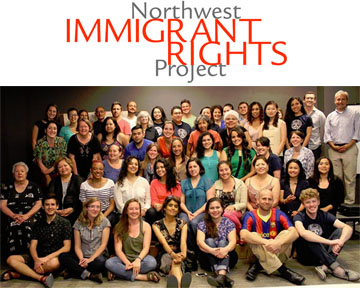LOCAL
State, NWIRP offer guidance on federal immigration compliance
 OLYMPIA (April 7, 2017) — In response to requests from state and local agencies, Washington State Attorney General Bob Ferguson has offered some guidance and best practices on how to keep Washington state a welcoming place for immigrants and refugees while complying with evolving federal immigration policies. KUOW offers a good summary of Ferguson’s “Sanctuary Playbook” here.
OLYMPIA (April 7, 2017) — In response to requests from state and local agencies, Washington State Attorney General Bob Ferguson has offered some guidance and best practices on how to keep Washington state a welcoming place for immigrants and refugees while complying with evolving federal immigration policies. KUOW offers a good summary of Ferguson’s “Sanctuary Playbook” here.
Similarly, the Northwest Immigration Rights Project (NWIRP) has received questions from non-profit organizations and social service providers about how to respond if federal immigration agents come to their offices or attempt to detain their clients/members.
Although NWIRP emphasizes that it’s unlikely that agents from Immigration and Customs Enforcement or Customs and Border Protection would come to a nonprofit agency, they do recommend being prepared to “protect their clients and staff to the greatest extent possible.”
 Following are a few highlights of their advice to non-profits, which also apply to union offices. (The NWIRP staff are proud members of OPEIU Local 8, by the way.)
Following are a few highlights of their advice to non-profits, which also apply to union offices. (The NWIRP staff are proud members of OPEIU Local 8, by the way.)
► Do not allow immigration agents access to non-public areas of the building unless they have a judicial search warrant (signed by a judge). Administrative arrest warrants (signed by an immigration officer) do NOT grant agents permission to enter areas of the building not open to the public. Similarly, do not release information about clients to immigration agencies unless they have a judicial warrant or subpoena specifically requiring the release of that information, unless of course, a client has specifically consented to such release.
► Adopt a protocol for what to do if immigration agents arrive and train your staff, especially those in the reception area, on how to respond. For example, train your receptionist and other staff to inform immigration agents that they do not have permission to enter non-public areas without a judicial warrant. If they have a warrant, a supervisor should be contacted to review it before granting access.
► Staff should advise any nearby clients that they have the right to remain silent and do not have to answer questions posed by immigration agents. Do not, however, direct clients not to speak to the agents. If staff or clients are engaged in questioning from immigration agents, they can ask if they are free to go. If the answer is “yes,” they can leave. If “no,” they should explain that they would like the opportunity to consult with an attorney and otherwise remain silent.
► Never take any action to hide or conceal someone or aid in their escape from the premises. Never lie to immigration agents. For example, if agents ask about an individual who is in the building, staff should not deny they are there. Instead, they can decline to answer questions about that person until they consult with a supervisor.
► Document the names/contact information of agents and their supervisors. Ask for their cards. If possible, record interactions with agent, making it clear that you are doing so.
The full NWIRP advisory offers many more suggestions, including specific policies and procedures for non-profit organizations to consider adopting. The advisory will be updated as new information becomes available. Check back at www.nwirp.org/resources/community-information for the latest.
The Northwest Immigrant Rights Project is a nationally-recognized legal services organization founded in 1984. Each year, the NWIRP provides direct legal assistance in immigration matters to more than 10,000 people. They strive to achieve systemic change to policies and practices affecting immigrants through impact litigation, public policy work, and community education. Learn more here.





